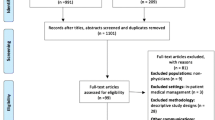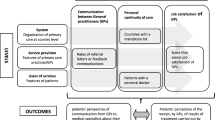Abstract
Various studies have shown that receiving a copy of the letter to the General Practitioner (GP) improves patient satisfaction with the consult. We aimed to establish whether dictating the letter to the GP in front of a listening patient does likewise. Follow-up patients have shorter allotted consultation times. This may contribute to dissatisfaction, hence the choice of our target group. One hundred consecutive follow-up patients who met the eligibility criteria were randomised to listen to the GP letter or not. Immediately after the consult, they were asked to fill in a questionnaire which, in addition to enquiring about various aspects of the consult asked them to quantify their overall satisfaction by means of a ten-point graded visual analogue score. Forty-nine patients received dictation. The mean age and sex distribution of the two groups were matched. The median overall satisfaction in the dictation and non-dictation groups were ten and eight, respectively, this was statistically significant. There was no significant difference between patients’ rating of whether the consult had addressed their ailment adequately, explanation(s) given or the length of consult. Sixty-one percent of patients in the non-dictation group would like to have listened to the dictation, whilst all patients in the dictation group found it useful. This study is the first of its kind in the ENT population. Dictating a letter to the GP in front of a listening patient led to a statistically significant improvement in satisfaction independent of possible confounding aspects of the consult.

Similar content being viewed by others
References
Roberts NJ, Partridge MR (2006) How useful are post consultation letters to patients? BMC Med 4:2. doi:10.1186/1741-7015-4-2
Pothier DD, Nakivell P, Hall CE (2007) What do patients think about being copied into their GP letters? Ann R Coll Surg Engl 89(7):718–721. doi:10.1308/003588407X205413
Saunders NC, Georgalas C, Blaney SP, Dixon H, Topham JH (2003) Does receiving a copy of correspondence improve patients’ satisfaction with their out-patient consultation? J Laryngol Otol 117(2):126–129. doi:10.1258/002221503762624576
Lloyd BW (1997) A randomised controlled trial of dictating the clinic letter in front of the patient. BMJ 314(7077):347–348
Ong LM, Visser MR, Lammes FB, van Der Velden J, Kuenen BC, de Haes JC (2000) Effect of providing cancer patients with the audiotaped initial consultation on satisfaction, recall, and quality of life: a randomized, double-blind study. J Clin Oncol 18(16):3052–3060
Knox R, Butow PN, Devine R, Tattershall MH (2002) Audiotapes of oncology consultations: only for the first consultation? Ann Oncol 13(4):622–627. doi:10.1093/annonc/mdf055
Conflict of interest statement
The authors has none to declare
Author information
Authors and Affiliations
Corresponding author
Appendix
Appendix
The questionnaire each patient was requested to fill in:

Rights and permissions
About this article
Cite this article
Ahmed, J., Roy, A., Abed, T. et al. Does dictating the letter to the GP in front of a follow-up patient improve satisfaction with the consult? A randomised controlled trial. Eur Arch Otorhinolaryngol 267, 619–623 (2010). https://doi.org/10.1007/s00405-009-1020-x
Received:
Accepted:
Published:
Issue Date:
DOI: https://doi.org/10.1007/s00405-009-1020-x




